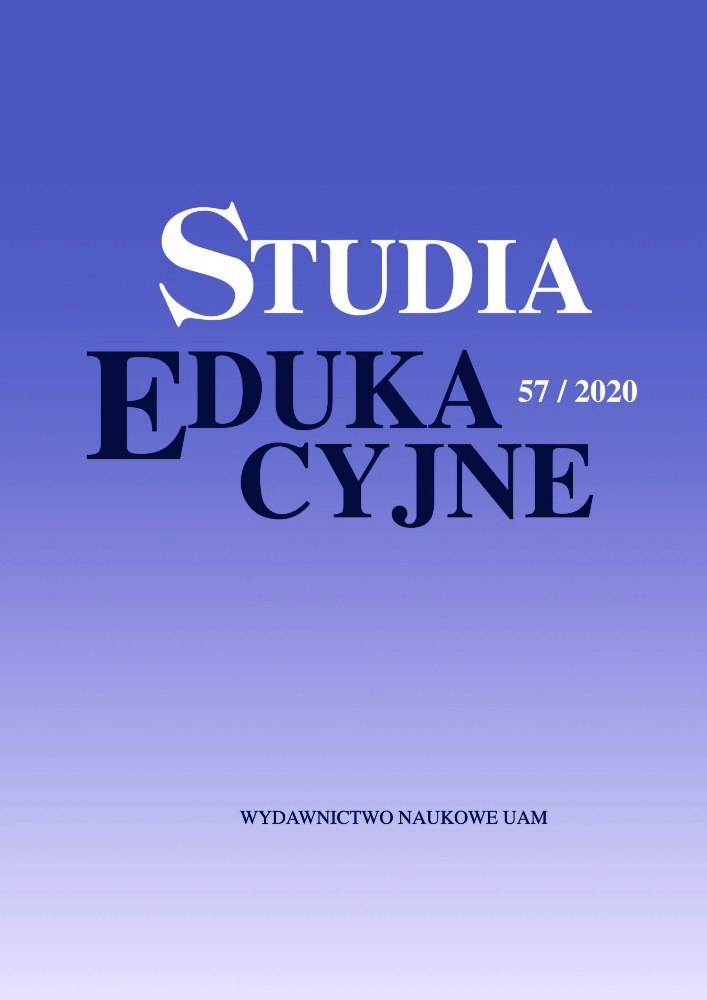Abstrakt
The world of social norms and values is constantly embedded in the teacher’s actions and the educational theories they recognise, in their didactic end educational successes and failures, in professional adaptation and evaluation, in didacticism and educational inspiration, and in the case of a few, in educational leadership deprived of the external and personal world. In every dimension of the teacher’s pedagogical activities there is a link between the acquired theoretical knowledge and the professional attitude. The pedagogical approximation into specific theories and pedagogical ideas is illustrated by the professional attitude of the teacher, interpersonal relations with students and the teaching staff. The knowledge of pedagogical paradigms, the realization of diverse ideas can be a factor in a teacher’s pedagogical success, as there is no single theory, explaining and suitable for a specific school community in the educational space. Contemporary pedagogical theories, like never in the past, are becoming a creator of social mentality in multicultural environments. They are becoming a “civilizational hope” for the reduction of traditional “prescriptive-distributive” thinking, as well as subject-based, directive and authoritarian education, and educational impossibilism in schools. Contemporary pedagogical controversies around the relationship of education and leadership do not have antagonistic content, elements that are pedagogically and socially opposed. They interact with each other in various and multi-level ways in the space of humanistic pedagogy and human resource management, they are a pedagogical dualism in the sphere of descriptive and relational narrative, critical thinking, without space for academic logomachia. The growing interest in the teacher’s autonomy, teacher’s independence, the dimensions of the presence in the pedagogical community, and the pursuit of individual needs are issues of external educational affiliation. What educational and cultural dimension should constitute the pedagogical habitus of a modern teacher? From the content of many pedagogical publications, a conclusion emerges that in education, it is not the teachers who become the motivators of exceeding knowledge and skills for themselves, but the students who exceed their teachers. Such a confrontation of the two worlds: teachers, representing institutionalised education and students (more precisely: learners), having one common goal – mutual understanding, which already requires a change in the generation paradigm, methods of operation, education (students and teachers), modification of the education already acquired, transformation of the model of “becoming” a teacher (usually based on authority – still traditional) more effectively appealing to students and systematic use of the new technological solutions in the education process. Increasingly, many pedagogical ideas and theories are starting to signal the need to transpose the role of the teacher in the spectrum of expert-conceptual practitioner, which is based on the methods and techniques of learning, i.e. critical thinking.
Bibliografia
Aronson E., Wilson T.D., Akert R.M. Psychologia społeczna, Zysk i S-ka Wydawnictwo, Poznań 1997.
Denek K., Aksjologiczne aspekty edukacji szkolnej, Wydawnictwo Adam Marszałek, Toruń 2000.
Holt J., Zamiast edukacji. Warunki do uczenia się przez działanie, przekł. D. Konowrocka, Oficyna Wydawnicza Impuls, Kraków 2007.
Kunowski S., Podstawy współczesnej pedagogiki, Wydawnictwo Salezjańskie, Warszawa 1993.
Kwaśniewski K., Tożsamość społeczna i kulturowa, Studia Socjologiczne, 1986, 3.
Melosik Z., Kultura popularna jako czynnik socjalizacji, [w:] Pedagogika. Podręcznik akademicki, tom 2, red. Z. Kwieciński, B. Śliwerski, Wydawnictwo Naukowe PWN, Warszawa 2003.
Okoń W., Nowy słownik pedagogiczny, Wydawnictwo Akademickie Żak, Warszawa 2001.
Ornstein A.C., Hunkins F.P., Program szkolny, problematyka, przekł. K. Kruszewski, Wydawnictwa Szkolne i Pedagogiczne, Warszawa 1998.
Sławiński S., Wychowywać do posłuszeństwa, Instytut Wydawniczy PAX, Warszawa 1994.
Suchodolski B., Wychowanie dla przyszłości, Państwowe Wydawnictwo Naukowe, Warszawa 1968.
Suchodolski B., Twórczość – rzeczywistość, nadzieje, wątpliwości, [w:] Wychowanie i strategia życia, Wydawnictwa Szkolne i Pedagogiczne, Warszawa 1983.
Toffler A., Toffler H., Budowa nowej cywilizacji. Polityka trzeciej fali, przekł. J. Łoziński, Zysk i S-ka Wydawnictwo, Poznań 1996.
Wojnar I., Edukacja humanistyczna i trzy kręgi tożsamości człowieka, [w:] Uczeń i nowa humanistyka, red. M. Kujawska, Instytut Historii UAM, Poznań 2000.

